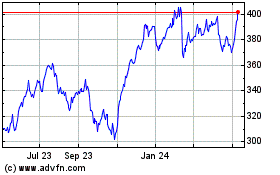U.K. Business Group Says Exit From EU Could Be Costly
March 21 2016 - 8:30PM
Dow Jones News
By Jason Douglas and Max Colchester
LONDON--Leaving the European Union could cost the U.K. economy
up to GBP100 billion ($145 billion) in lost income by 2020 and
almost 1 million jobs, one of the U.K.'s most influential business
groups said on Monday, in a report that adds fresh fuel to an
already heated debate in the U.K. about its relationship with
Europe.
Separately, a financial-services lobby group said that Britain's
financial sector could be hit in the event of so-called Brexit
while, in a third report, credit-rating agency Moody's Investors
Service said that a vote in favor of departure could have negative
consequences for the creditworthiness of British-based companies
and the U.K. government.
The trio of reports bolster Prime Minister David Cameron's
arguments that the U.K. would be better off economically by
remaining in the EU ahead of a referendum in June.
But they also come as Mr. Cameron faces deepening divisions
within his ruling Conservative Party over the U.K.'s future in
Europe and broader government strategy, after a senior government
minister who supports Britain's exit from the EU resigned on
Friday, citing differences over economic policy.
Proponents of Britain's exit say claims that the economy will
suffer are exaggerated, arguing instead that the economy will be
freer to prosper outside of the EU because the U.K. could focus on
trade with faster-growing regions and won't be burdened by the cost
of membership.
Senior figures from both sides of the campaign will duke it out
this week in appearances before a parliamentary committee looking
into the costs and benefits of the U.K.'s EU membership. Pro-Brexit
London Mayor Boris Johnson provides testimony on Wednesday and U.K.
Treasury chief George Osborne is due to argue for the benefits of
remaining in the EU when he appears on Thursday.
In its report on Monday, the Confederation of British Industry,
which represents around 190,000 employers in Britain, said that it
assessed the economic impact of leaving the EU based on two
possible post-exit futures: One in which the U.K. wasn't an EU
member but was able to negotiate a free-trade deal with the other
27 members of the bloc, and a second scenario in which no such deal
was reached and the relationship between the EU and the U.K. was
governed by the World Trade Organization.
The analysis suggested that the British economy could be around
3% smaller by 2020 under a free-trade deal than it would be had it
stayed in the EU, and 5.5% smaller under a WTO deal. That equates
to between GBP55 billion and GBP100 billion of lost income,
according to the report, which was prepared by business services
firm PricewaterhouseCoopers LLP for the CBI.
In both scenarios, the largest drag on growth comes from weaker
investment, particularly in the short-term, as the U.K. would need
to negotiate some form of continued access to the EU's single
market for goods and services. Trade and immigration are also
forecast to be lower.
Employment growth could also suffer if Britain left the EU, the
CBI said. It estimated that there would be 550,000 fewer jobs in
the economy by 2020 under the free-trade scenario, compared with
continued EU membership, and 950,000 fewer under the WTO
scenario.
But the report highlighted that the drag on the economy from
leaving the EU would eventually fade--a finding quickly seized on
by proponents of quitting the bloc. The CBI said it estimates the
economy would be 36% to 39% larger in 2030 than in 2015 under
either exit scenarios, but staying in would mean only a slightly
larger boost, of 41%.
Vote Leave, which campaigns in favor of a British exit from the
EU, criticized the CBI's analysis in a lengthy rebuttal, saying
that many of its assumptions were "unrealistic and unreasonable."
David Davis, a Conservative lawmaker and advocate of leaving the
EU, accused the CBI of "scaremongering."
In a separate analysis on Monday, the Association for Financial
Markets in Europe said that some financial-services activity could
move out of the U.K., with investment, wealth and private banking
especially vulnerable to any restrictions on cross-border activity.
Banks and other financial firms based in the U.K. can currently
sell their products and services in all EU countries, but such
"passporting" arrangements may be threatened if the U.K. wasn't an
EU member, the group's report said.
Supporters of leaving say that the U.K. would be able to hammer
out favorable access to the EU while also getting more freedom to
dictate financial regulation. But some investors say that there
could be an EU backlash against the U.K. if the country tries to
position itself as an offshore financial center: A Morgan Stanley
poll of investors found that 67% thought that the EU would strike
back if the U.K. tried to market itself in this way.
Moody's, in its report due to be published on Tuesday, said that
it believes the economic costs of leaving the EU outweigh the
benefits. The agency said that departure would likely trigger
downgrades on the ratings of U.K. corporate bonds because of likely
new barriers to trade and immigration.
Brexit could also result in a negative outlook for the U.K.'s
own credit rating, currently one rung below the agency's highest
credit grade, Moody's said.
Moody's added that the U.K. and the remainder of the EU would
have strong incentives to minimize the economic impact of a British
departure, given the strong links between the two, which Vote Leave
highlighted as evidence that concerns over lost trade are
overblown.
Write to Jason Douglas at jason.douglas@wsj.com and Max
Colchester at max.colchester@wsj.com
(END) Dow Jones Newswires
March 21, 2016 20:15 ET (00:15 GMT)
Copyright (c) 2016 Dow Jones & Company, Inc.
Moodys (NYSE:MCO)
Historical Stock Chart
From Mar 2024 to Apr 2024

Moodys (NYSE:MCO)
Historical Stock Chart
From Apr 2023 to Apr 2024
